Latest Contributions
Rao Travels-Munabao Here I Come !

Shriprakash Rao attended St. Xavier's School, Jaipur where he was a sports enthusiast, with particular emphasis on cricket and basket ball. He was also a good short-distance swimmer.
Rao joined the Department of Customs and Central Excise as Inspector, and retired as Additional Commissioner in 2015. He traveled to many nations as a trade negotiator for the Central Government on several occasions for various trade agreements.
Rao is an avid adventurer who has under taken trekking expeditions across Himalayas in India and Nepal. He fancies his visit to Iceland to see the Northern Lights to be the crown jewel of his travels. He is a keen photographer while traveling.
Rao loves driving and has under taken many long drives across India, initially on his motor cycle and later on by car. He is an avid reader and a movie buff, especially of classic westerns.
Rao presently lives in Jaipur with his wife.
Rao Travels to Pakistan
Now I had been working in Board (CBEC) for over two years. I had become used to meeting senior officers like Chairman, Members/Revenue Secretary and even Finance Minister sometimes. My primary work related to Customs valuation matters (vis a vis World Customs Organization)& issue ad hoc exemptions exempting from Customs duties.
I was also looking after the additional charge of the International Customs Division (ICD). As ICD looked after all work related to formulations of Rules of Origin in various Free Trade Agreements being negotiated by the Department of Commerce, I was closely associated with them. Thanks to the encouragement of my Director (Dr. Anoop Swaroop) and some hard work by me, I had mustered up enough courage to go through successfully in various negotiations. The Commerce Secretary seeing my work nominated me as one of the representatives of CBEC (with approval of CBEC) on the Expert Group on Rules of Origin set up by the PMO. As a result of this extensive work with the Department of Commerce, I had travelled to all countries of SAARC (except Pakistan), all countries of ASEAN, some countries of the SACU/MERCOSUR group (South Africa/South America). As negotiations for a comprehensive trade agreement with South Korea & Japan had just been started, I was looking forward visit these countries too.
Personally, my family life too had become quite normal (readers may remember my acrimonious departure from IGI Airport).
https://www.inourdays.org/civil-servants/all-s-well-ends-well.
With regular office hours (office ended at six but could rarely leave before eight pm), I could now give sometime to my son who was in 12 standard. My friend Ravi (remember him!!) meanwhile had also been posted to TRU (Tax Research Unit) in Board’s office.
We shared a common interest in listening to blues & jazz, besides enjoying various cuisines. Thus, began a journey to various nook and corners of Delhi to enjoy local delicacies. Soon this became very popular and many Under Secretaries of the Board joined in. Andhra House, Pandara Road, Paratha walon ki gali, Murthal were some the favorites.
Ravi and I also managed to watch some fantastic musicians / jazz maestro like Buddy Guy, and rock groups like Metallica etc in action I also saw many concerts of Zakir Hussain, Pandit Jasraj, Pandit Bhimsen Joshi etc. So its was regular like as usual when one day Ravi came up with the news the famous rock group Jethro Tull was going hold a concert in Mumbai(thankfully coinciding with a Chief Commissioner’s conference) and he had passes for the same.
We had planned everything and were eagerly awaited for the day to arrive. But a few days later Member (Customs) called me on the intercom as soon as I had come to the office. By this time calls by Member/Chairman had become routine. So, I decided to finish my morning tea before going downstairs. I was halfway through my tea when Member again called, asking me to come down immediately.
On reaching the Member’s room, I saw that JS (Customs), OSD Finance Minister and Director (ICD) were in deep conversation. Member looked up at me and gestured me to take a seat and wait for fo my turn. Within a few minutes I could make out the group was discussing about the impending visit of Member (Traffic), Railway Board with his team to decide on the opening of Munnabo-Kokharapar Rail link in Rajasthan.
As it was not part of my work I just sat waiting for my turn. The meeting concluded after sometime and OSD left.
Now it was my turn. Member turned towards me and informed me that US (Land Customs- a nice Appraiser promotee from Kolkata) had been nominated to go with the Indian delegation to Pakistan but had just refused to go to Pakistan. He further added that FM had suggested I go in his place as I have experience in attending trade negotiations. This was a bolt from the blue. Here I was readying myself for a Jethro Tull concert in Mumbai, and now I was getting a chance to visit Pakistan.
I immediately said yes.
It soon became news in North Block. I chided Under Secretary S (Land Customs) as to how he could miss such an opportunity. He just said he did not want to go for personal reasons. As there was a week to go, I immersed myself in all the files related to Munnabo-Kokhapar negotiations. I also went to Rail Bhawan and met Member (Traffic) and other delegates. Thankfully, the representatives of Commerce & Foreign ministries, though senior, had become friends from various other negotiations.
Finally, the day to leave came. It was early October, 2006. As the meetings were to start on a Monday, we had to leave on Friday (by PIA) as there were no other flight over the weekend. I and other members of the delegation checked in & boarded the PIA flight to Islamabad. We were welcomed by a pretty air hostess who was already aware of the status of the delegation. Member (Traffic) was duly escorted to the business class while all of us were made comfortable in the economy class.
One thing I immediately noticed was that except for an Urdu paper there was nothing in the plane (not even the customary airline magazine). After about 30 minutes we were served lukewarm tea. That was the last we saw of the air hostess. No food, even though the flight was for about 90 minutes.
With nothing much to do, I started going through ads in English in the Urdu paper. One thing we all immediately noticed in the government ads, was that reservations were also a feature in Pakistan. Only unlike in India, the reservations were based statewise viz- Punjab/Sindh/NWFP etc. Before landing the air hostess came and collected all newspapers (counted the pages too). After a ninety-minute flight, we landed at the swanky Islamabad airport (we were still in the UPA era & airport privatization was yet to start in India). As is the usual case we being holders of official passports, were whisked through immigration & customs. Soon we were on our way to our hotel. As we drove to the hotel through the streets of Islamabad, we could not help but admire the boulevards, cleanliness of Islamabad.
After some time we reached Hotel Serena, our abode for the next few days. It was a beautiful hotel like our Maurya in Delhi. We all decided to settle in our rooms and then meet in the lobby for dinner. We all got together at eight & decided to have a couple of drinks before dinner, only to learn that there was no bar.
As we were foreigner(s) we could be served alcohol but the cost of a peg was much more than our per diem. Sadly, we all trooped to the restaurant only where I as a sole vegetarian member was to meet another problem-lack of vegetarian dishes. Thankfully, the chef cooked dal & some vegetables for me.
After dinner, as is customary, it was announced that we are scheduled to meet Indian High Commissioner for breakfast the next day. In the morning, as soon as we left for Indian High Commission, it became clear that unlike in Delhi, all embassies/consulates in Islamabad are housed in a demarcated area having only one entry/exit (manned by Pak police)
Finally, we reached our High Commission. We waited for the High Commissioner, who was Sh. Shiv Shankar Menon, who later on went to become our Foreign Secretary & NSA. Sh. Menon gave us a brief on how to present ourselves in all meetings as this was Pakistan (and not any other foreign country). He further advised we would be under constant watch by police and nothing is to be discussed in our rooms (as most likely bugged). We left the High Commission in a sombre mood which became even darker as we all noticed that we were being tailed by a marked police car.

Hotel Serena Islamabad where the Indian delegation stayed.
The rest of the day was spent going around Islamabad & its twin city, Rawalpindi. Islamabad is a wonderful place with wide tree-lined boulevards, with towering mountains all around. We were told that in winter all mountains would be covered in snow. Rawalpindi was like any other city we see in Punjab. We also saw all the important buildings in Islamabad, of which crowning glory was the King Faisal mosque (built with assistance from Saudi Arabia-hence the name). They also have a road in Islamabad (forgotten the name) like our Rajpath where Independence day celebrations are held. The road reminded me of Champs Elysee of Paris. As we had one full day (Sunday) our hosts asked us where we would like to go. Being a student of history & also our cricket team had recently been there, I immediately said Takshashila (which they pronounce Tax-la). It was informed by the host that it was close to Islamabad but the main problem was it was not covered in our visa. As per our visa, we could travel only to the cities of Rawalpindi & Lahore (we were returning via Lahore). However, as even Member (Traffic) voiced his approval, we were told efforts would be made to include it in our visa.
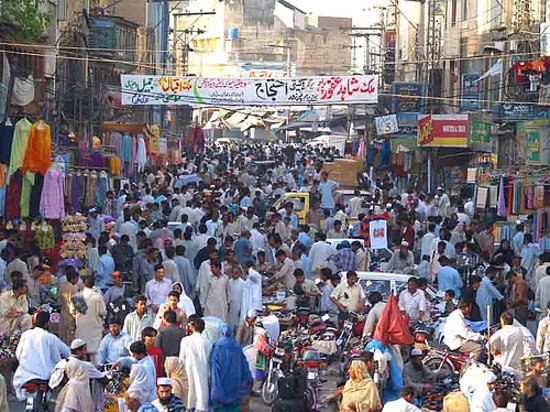
Bazzar Pindi
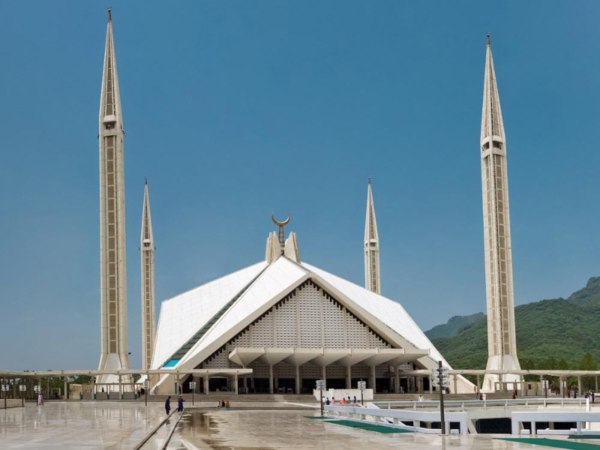
King Faisal Mosque Islamabad
Late in the night, it was informed that we would leave for Takshashila in the morning. Those were days with Musharraf at the helm of Pakistan and there was a lot of bonhomie between the two countries.
So after a leisurely breakfast, we left for Takshashila, with our watch car boldly tailing us (after two days all pretensions had been dropped). After a fifty minute drive on a highway like Noida Agra Expressway, we reached Takshshila ruins.
I was spellbound by the vista before me. Complete ruins with well out streets, houses, shops could be easily made. Mind you we were seeing ruins that were centuries old. The town planning of which we are so concerned today paled in front of these centuries-old ruins. All of us ran about like children discovering new things and comparing them to the present. After a wonderful few hours, our host suggested we could go to the museum below. I asked him as everything so well laid for all to see, what is there in the museum. The curator of the museum who joined us by now sheepishly said lots of idols, statutes (some nude) were also found during the excavations. He further added that the display of these idols/statues has caused ire with some organizations and had been vandalized. Seeing to the historical importance they were kept safe in the basement vault. So, another couple of hours were spent admiring those idols/statues. We were not allowed to take pictures. We finally came back to Islamabad in the evening happy and contended. I was actually at the top of the world that I was able to see the ruins of the famed Takshashila.
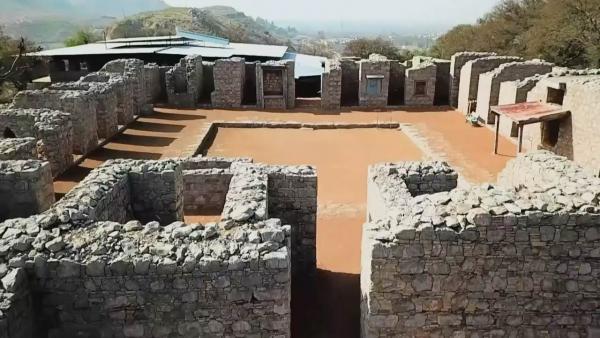
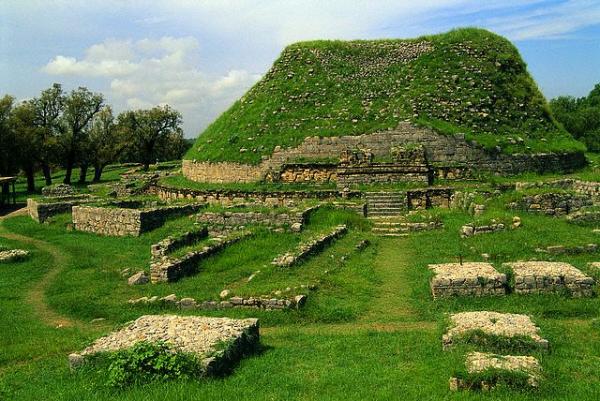
On Monday our meetings started. We first called on the Hon’ble Minister of Railways, Pakistan. A very pleasant one hour was spent with him. While leaving we exchanged souvenir. We were given a cap & tie of Pakistan Railways, which sadly has not seen daylight even till today.
The meetings continued over the next three days. Fortunately, not much was required to be me as the representative of CBEC. I met the representative of the Central Board of Revenue, Pakistan (now Federal Board of Revenue), with whom I was acquainted due to our regular meetings during SAFTA negotiations. Days were spent in meetings while evenings were spent in long walks in the parks of Islamabad in the company of every faithful watcher. Daily lunch would take place in the tony Islamabad Golf Club.
On the last day, the meetings were over by lunch. As we were wondering what to do in the evening, the Minister of Railways in his farewell speech announced that we would be taken to a place called Murree, a famous hill station in Pakistan, which was about 30 kms from Islamabad. A wonderful winding road in the hills took us to Murree. As soon as I stepped out of the car, my first thought was how familiar the place looked. It was as if we were in any hill station in India like Shimla, Mussorie or Dalhousie. All of us strolled along the lanes of Murree comparing to hill stations in India. The guide informed us that the range we could see in front of us was PirPanjal range, and on the other side is Kashmir. With these sombre thoughts in mind, we returned to Islamabad.
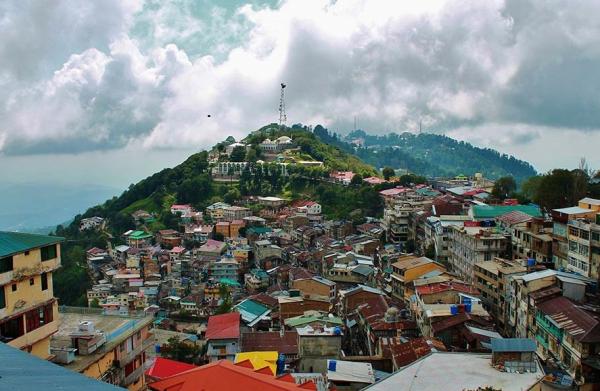
The next morning we left for Lahore. There was no work in Lahore but as there was no flight from Islamabad to New Delhi on that day we had left from Lahore. We reached Lahore after a short flight of forty-five minutes. As our flight to Delhi was in the late evening, our hosts had planned a rushed visit to Lahore.
As we went through Lahore, it was like I was going through any town in Punjab like Patiala or Amritsar. Finally, we reached Minar-e-Pakistan. It’s a very important site for every Pakistani. The tower was built between 1960 and 1968 on the site where the All-India Muslim League passed the Lahore Resolution on 23 March 1940 - the first official call for a separate and independent homeland for the Muslims of British India, as espoused by the two-nation theory.
After spending some time we visited Lahore Fort. The fort built by Akbar is modelled on our Red Fort but a very small version of it. We finally went to the famous Anarkali Market of Lahore. We were told that what we are seeing is a very poor version of the market as the market came to life only after dark. Some times were spent buying trinkets for friends & relatives back home. Finally, as we drove into Lahore Airport, I saw a road sign saying -Wagah-27 kms, Amritsar- 49 kms. I finally left for Delhi with this image of a road sign forever etched in my mind.
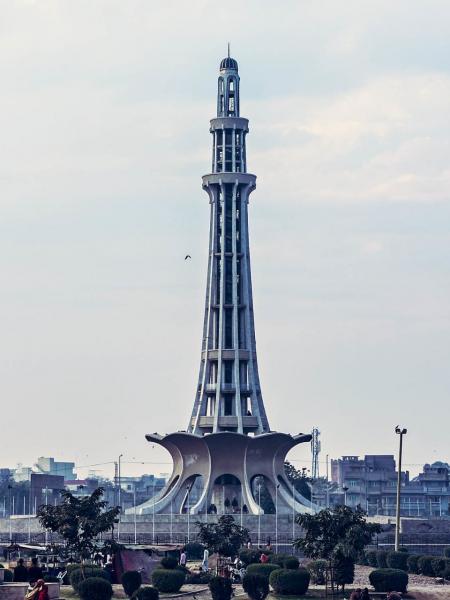
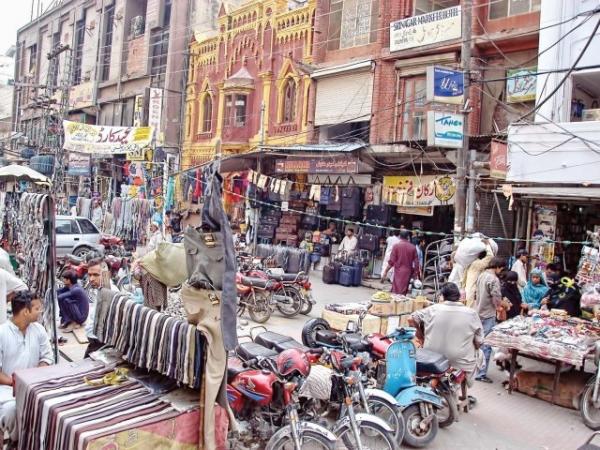
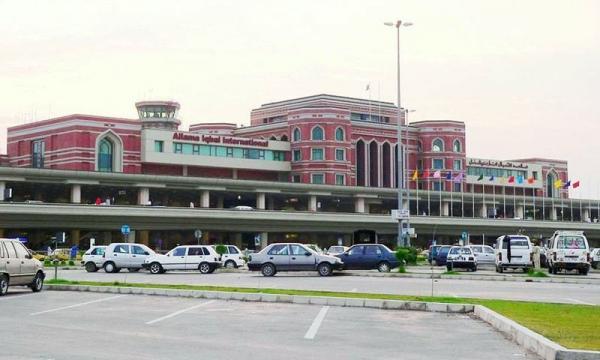
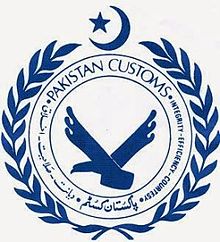
During my career, I have travelled to many countries and even more after retirement. But this impromptu visit to Pakistan holds a special place in my heart. Wherever I had been, I was always looked upon as a foreigner. I did not feel like an outsider in Pakistan. They looked like, spoke like, ate like me. Same Sardar ji/Pathan jokes were told in conversations. English was spoken with the same connotations as my Punjabi friends do. This was in spite of the fact that the Pakistan govt officials were assigned to facilitate the delegation, made all out efforts that the local Pakistani citizens could never interact with delegate member independently. Much has happened after my visit, which has altered the relations between the countries. But I am sure the average Pakistani still thinks fondly of the land of his ancestors.
And yes, Ravi still reminds me of the missed Jethro Tull concert.
Editor Adds
Jethro Tull are a British rock band formed in Blackpool, England in 1967. Initially playing blues rock and jazz fusion, the band later developed their sound to incorporate elements of hard rock and folk to forge a progressive rock signature. The band is led by vocalist/flautist/guitarist Ian Anderson and has featured a revolving door of lineups through the years among of which include significant members such as longtime guitarist Martin Barre, keyboardists John Evan, Dee Palmer, Peter-John Vettese and Andrew Giddings, drummers Clive Bunker, Barrie "Barriemore" Barlow and Doane Perry, and bassists Glenn Cornick, Jeffrey Hammond, John Glascock, Dave Pegg and Jonathan Noyce.
Jethro Tull

Comments
Pakistan
Thanks for an honest and fascinating glimpse of modern Pakistan and ancient ruins!
Add new comment